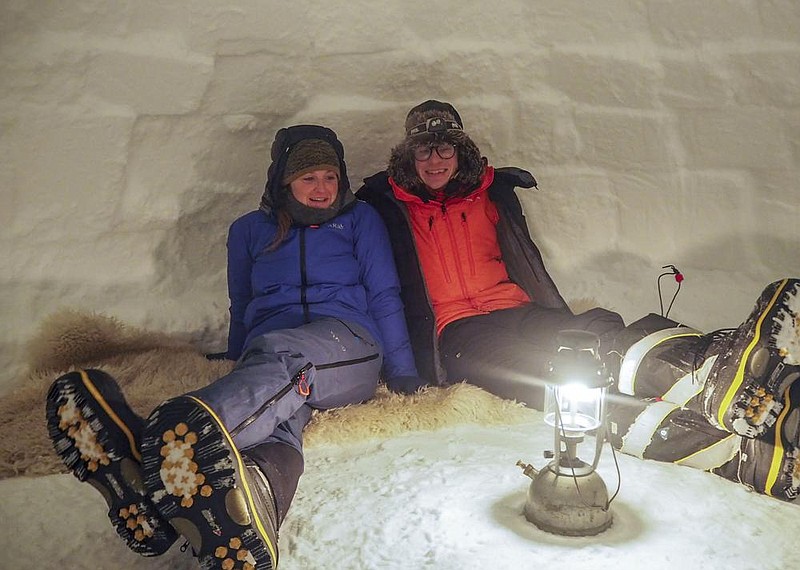JOHANNESBURG -- At this very moment a vast world exists that's free of the coronavirus, where people can mingle without masks and watch the pandemic unfold from thousands of miles away.
That world is Antarctica, the only continent without covid-19. Now, as nearly 1,000 scientists and others who wintered over on the ice are seeing the sun for the first time in weeks or months, a global effort wants to make sure incoming colleagues don't bring the virus with them.
From the U.K.'s Rothera Research Station off the Antarctic peninsula that curls toward the tip of South America, field guide Rob Taylor described what it's like in "our safe little bubble."
In pre-coronavirus days, long-term isolation, self-reliance and psychological strain were the norm for Antarctic teams, while the rest of the world saw their life as fascinatingly extreme.
[CORONAVIRUS: Click here for our complete coverage » arkansasonline.com/coronavirus]
How times have changed.
"In general, the freedoms afforded to us are more extensive than those in the U.K. at the height of lockdown," said Taylor, who arrived in October and has missed the pandemic entirely. "We can ski, socialize normally, run, use the gym, all within reason."
Like teams across Antarctica, including at the South Pole, Taylor and his 26 colleagues must be proficient in all sorts of tasks in a remote, communal environment with little room for error. They take turns cooking, make weather observations and "do a lot of sewing," he said.
Good internet connections mean they've watched closely as the pandemic circled the rest of the planet. Until this year, conversations with incoming colleagues focused on preparing the newcomers. Now the advice goes both ways.
"I'm sure there's a lot they can tell us that will help us adapt to the new way of things," Taylor said. "We haven't had any practice at social distancing yet!"
At New Zealand's Scott Base, rounds of mini-golf and a filmmaking competition with other Antarctic bases have been highlights of the Southern Hemisphere's winter, which ended for the Scott team when they spotted the sun recently. It had been away since April.
[Gallery not loading above? Click here for more photos » arkansasonline.com/913covid/]
"I think there's a little bit of dissociation," Rory O'Connor, a doctor and the team's winter leader, said of watching the pandemic from afar. "You acknowledge it cerebrally, but I don't think we have fully factored in the emotional turmoil it must be causing."
His family in the U.K. still wouldn't trade places with him. "They can't understand why I came down here," he said. "Months of darkness. Stuck inside with a small group of people. Where's the joy in that?"
O'Connor said they will be able to test for the virus once colleagues start arriving as soon as Monday, weeks late because a huge storm dumped 20-foot snowdrifts. Any virus case will spark a "red response level," he said, with activities stripped down to providing heating, water, power and food.
While covid-19 has rattled some diplomatic ties, the 30 countries that make up the Council of Managers of National Antarctic Programs teamed up early to keep the virus out. Officials cited unique teamwork among the United States, China, Russia and others.
As a frightened world was locking down in March, the Antarctic programs agreed the pandemic could become a major disaster. With the world's strongest winds and coldest temperatures, the continent roughly the size of the United States and Mexico is already dangerous for workers at 40 year-round bases.
"A highly infectious novel virus with significant mortality and morbidity in the extreme and austere environment of Antarctica with limited sophistication of medical care and public health responses is High Risk with potential catastrophic consequences," according to a council document seen by The Associated Press.
Since Antarctica can only be reached through a few air gateways or via ship, "the attempt to prevent the virus from reaching the continent should be undertaken IMMEDIATELY," it said.
No more contact with tourists, the Antarctic council warned. "No cruise ships should be disembarking." And for Antarctic teams located near each other, "mutual visits and social events between stations/facilities should be ceased."
Antarctic workers have long been trained in hand-washing and "sneeze etiquette," but the council slipped in that reminder, adding, "Don't touch your face."
In those hurried weeks of final flights, the U.S. "thankfully" augmented medical and other supplies for winter and beyond, said Stephanie Short, head of logistics for the U.S. Antarctic program.
"We replanned an entire research season in a matter of weeks, facing the highest level of uncertainty I've seen in my 25-year government career," she said.
Antarctic bases soon slipped into months of isolation known as winter. Now, with the glimmer of spring, the next big test has begun.








